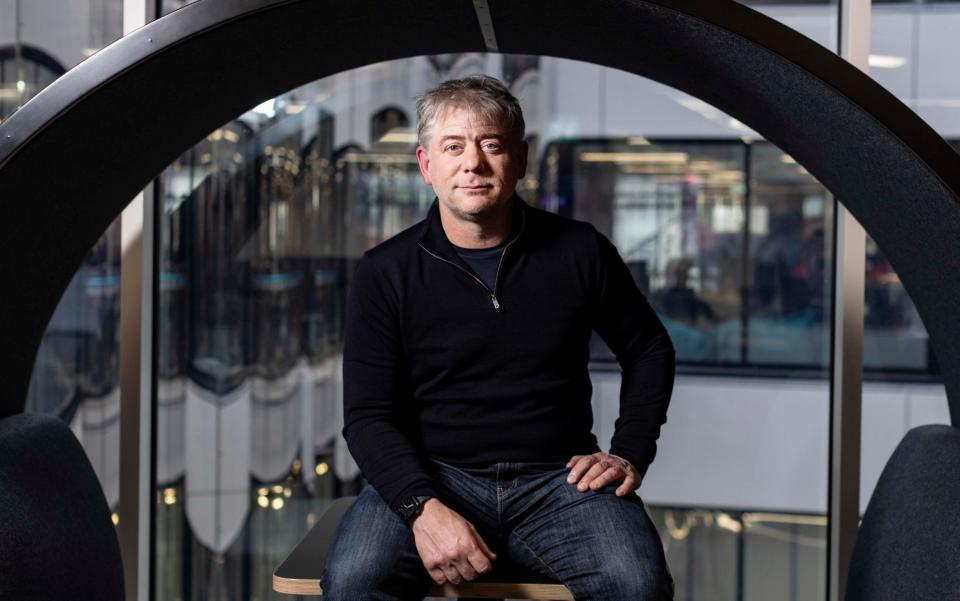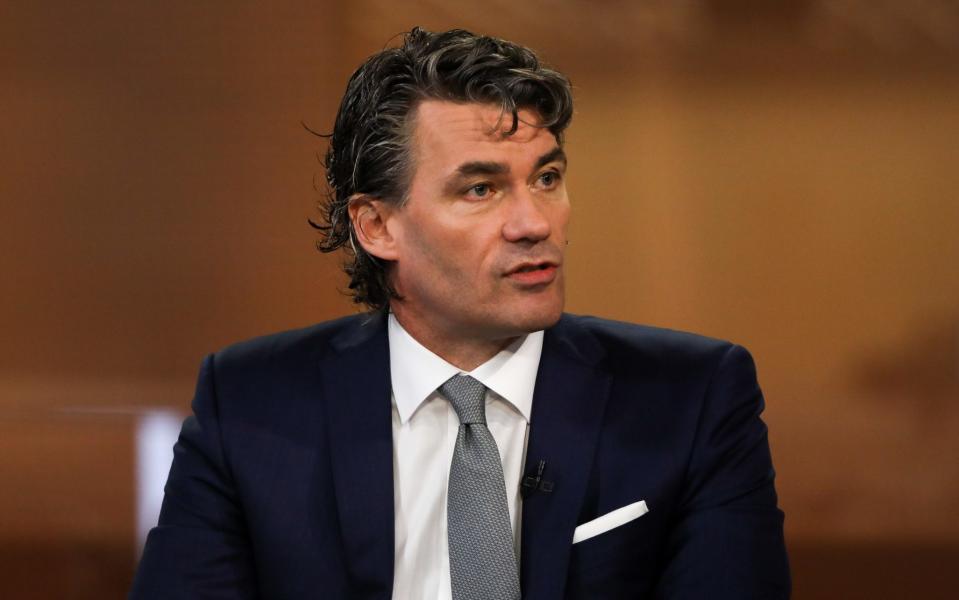Octopus chief threatens to shift billions in energy investment overseas

British energy giant Octopus has warned that grid connection delays and planning hold-ups could force it to shift billions of pounds in investment overseas.
Chief executive Greg Jackson, who met with Chancellor Jeremy Hunt last week, as well as policymakers in France and Germany, said the UK must overhaul its electricity grid if it wants to boost domestic investment.
Long delays in the time it takes to get connected to the National Grid mean Octopus is facing waits of more than a decade to develop some projects. While the company waits, its investment is likely to go overseas, Mr Jackson said.
He told The Telegraph: “We have got access to billions of pounds of capital. We’d like to deploy that here in the UK but capital goes where it can be deployed.
“At the moment, it is easier to build a lot of infrastructure in France and Germany than here in the UK.”
As well as Britain, Octopus operates in France, Italy, Germany, Spain and Japan.
The company powers seven million UK households and is now valued at £6.2bn. It is spearheading Britain’s green energy revolution by rolling out thousands of solar panels, wind farms and heat pumps.
However, Mr Jackson said his business is being held back by a bureaucratic electricity grid.
“There’s a solar farm we want to build in County Durham and we won’t get a grid connection until 2037. That’s 13 years where that capital can’t be deployed.
“At the same time, we can deploy capital in other countries.”

The grid operates a first-come, first-serve system for connections, with each project assessed regardless of how far along it is. This has led to a long backlog, including for viable projects from established operators.
Ofgem and ESO, the UK’s Electricity System Operator, pledged to tackle long wait times for grid connections last autumn by removing unrealistic and speculative projects from the queue.
However, dozens more applications have joined the register since the crackdown was announced and some developers have threatened legal action, bogging down the process.
Mr Jackson’s warning on investment comes days after Octopus’s energy arm posted its first-ever profit since its launch in 2015, a milestone that will prompt him to take a proper salary after limiting himself to the minimum wage since the energy crisis.
He refuses to say what his annual salary will be once it is reinstated in the coming weeks but it is likely to be in the region of £180,000 – £30,000 higher than what he was paid three years ago.
However, Mr Jackson, 52, said he will not be taking a bonus.
He said: “Octopus is not really a bonus culture. Very few people get bonuses and I think they drive short-term behaviour.”
This concession sets Mr Jackson apart from Chris O’Shea, chief executive of British Gas owner Centrica, who controversially received £3.7m on top of his annual salary of £790,000 in 2022. That was despite British Gas’ involvement in the prepayment meter scandal.

Mr Jackson owns a 6pc stake in Octopus worth hundreds of millions of pounds, although he says he does not know how much he is worth.
He made the bulk of his fortune before launching Octopus after selling off a string of companies, including medical technology manufacturer Consultant Connect.
Octopus Energy’s £283m pre-tax profit announced late last month came after it consolidated its position in the market by hoovering up millions of customers from collapsed suppliers such as Bulb and Avro Energy, which tripled revenues to £12.5bn.
It has also benefited from growing demand across its green energy generation and EV leasing divisions, which continue to thrive despite increased scrutiny of net zero.
Mr Jackson believes fossil fuel companies are responsible for whipping up a backlash against the transition, as they are fearful of renewables replacing oil and gas.
He said: “I think 2023/24 is the year in which fossil fuel companies have woken up to the very real threat that their businesses now face. Already, electric vehicles are taking 1.5 million barrels of oil off the road every day.
“That’s enough for oil companies to start noticing problems and you are beginning to see some scale back production forecasts.
“As a result, some are trying to foster a backlash against the [net zero] transition. I think some of them are beginning to get very worried about what their future looks like.”
Rishi Sunak decided to water down a series of Britain’s climate policies last year, caving to pressure from the Net Zero Scrutiny Group of backbench Conservative MPs.
One would expect Mr Jackson to criticise the Prime Minister’s move to delay the petrol car ban and weaken the phase-out of gas boilers, given his business revolves around the shift to green energy.
However, he sees the logic behind it: “The Government changed some of the policies that were a lightning rod for backlash.
“Some of them made people feel like they were being strong-armed.”
Mr Jackson is politically shrewd. He met with the Net Zero Scrutiny Group late last year, talking shop with climate sceptics such as Craig Mackinlay MP and Sir John Redwood MP.
It was a “tremendously good meeting”, Mr Jackson said, at which he argued that solar and wind technology can provide cheap and reliable energy without government handouts.
“For me, as a free-marketeer, I want more free markets here and fewer government-run programmes,” he said, adding that Texas, a Republican stronghold, has more renewables than any other state in the US.
Given the size and scale of Octopus, which employs more than 6,000 workers and is backed by investors such as the Canada Pension Plan Investment Board, Mr Jackson’s opinions carry influence in the corridors of Westminster.
Asked if he wants to list Octopus Energy on the London Stock Exchange, or carve out its rapidly expanding software platform Kraken to take it public, Mr Jackson is doubtful.
“In today’s world, where you have access to large amounts of capital without going public, there’s a lot less need to do so.
“We have got access to a large amount of capital and we’ve raised $2bn on our balance sheet. There’s no lack of capital and staying private allows us to keep investing in the long term.
“For us, the current structure is probably the best way forward rather than listing. There’s always a queue of people who want to invest.”
Both the energy division and Kraken currently sit within the broader Octopus group, although there is a growing separation.
Octopus’s retail business is responsible for generating and delivering clean energy to households and businesses.
Kraken, meanwhile, is a customer service software platform servicing 54 million accounts, including many who don’t use Octopus energy. The software is licensed to rival suppliers such as E.On.

The degree of independence between the two divisions is clear when walking around Octopus’ flagship office near London’s Oxford Circus: e-security gates have been erected to strengthen the Chinese wall and avoid conflict concerns.
Kraken is chaired by former BT chief executive Gavin Patterson, who first encountered Mr Jackson while the pair were working for Procter & Gamble 30 years ago.
Like Mr Jackson, he shares the view that Kraken, which he says will soon generate billions of pounds in revenue compared to hundreds of millions now, is best kept private.
Mr Patterson said: “The public markets can be very unforgiving for young growth companies. You can have a couple of bad quarters and the shareholders will just desert you.”
Regardless of when or if either Octopus Energy or Kraken go public, Mr Jackson is confident that the group’s expansion will continue.
He plans to hire a further 4,000 employees in the UK this year alone, as he strives to build a “British-based global energy major” that rivals behemoths such as Saudi Aramco and Exxon.
“Our businesses in France, Italy, Germany, France, Spain and Japan are all growing on the same trajectory that the UK did.
“This isn’t a new version of a traditional energy business. It’s a different kind of business.”
